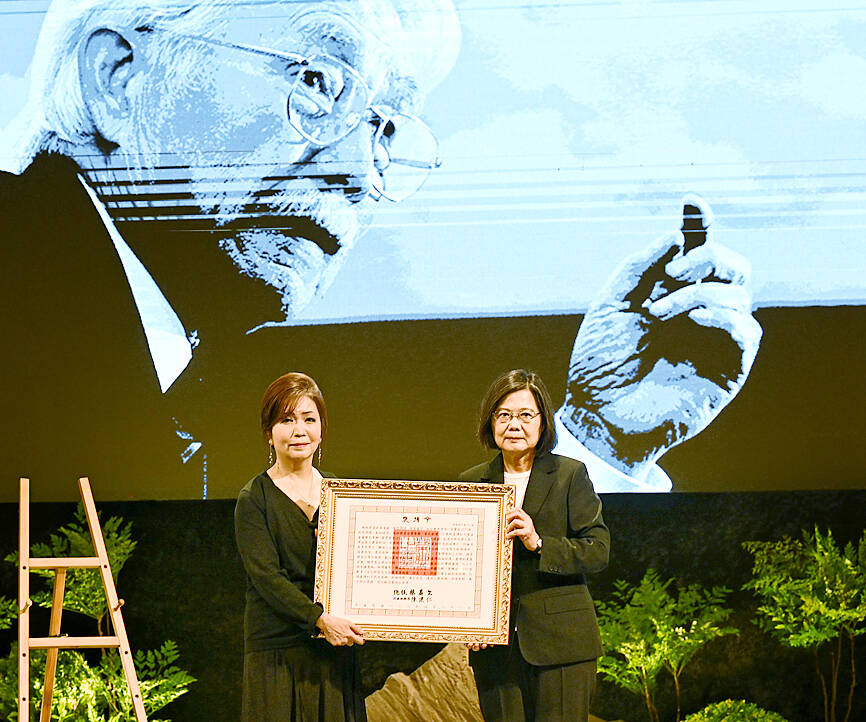A memorial held yesterday for late Taiwanese independence advocate and senior presidential adviser Koo Kwang-ming (辜寬敏) paid tribute to Koo’s efforts toward the normalization of Taiwan’s international status.
Koo passed away on Feb. 27 at the age of 97.
What concerned Koo most was the relationship between Taiwan and China, said his son Richard Koo (辜朝明), who is the chief economist at Japan’s Nomura Research Institute.

Photo: Fang Pin-chao, Taipei Times
Koo Kuang-ming had believed that Taiwan could not develop as a normal country unless it had peaceful relations with China, and had proposed the concept of a “federation of brothers” in which both countries would recognize each other’s independence and enjoy mutually beneficial ties.
Richard Koo said at the service that what impressed his family most about his father was his business achievements.
“My father had failed in the past, and was 68 when he finally established a successful business,” he said.
Upon Koo Kuang-ming’s return from Japan 35 years ago, he was advised by his friend Yang Tsung-che (楊宗哲) that career success wields influence in Taiwan, Richard Koo said.
“He traveled to several Pacific island countries in the process of starting his own business in the fisheries,” he said.
Koo Kwang-ming believed that declaring independence would not be difficult for Taiwan, but it would be more of a struggle to establish a framework for Taiwan and China to peacefully coexist and share interests.
Koo Kwang-ming said that Taiwan and China could share close ties if the right conditions were met.
“Before he was hospitalized, my father often called me in Tokyo to talk about how he could share his thoughts on cross-strait ties with the Chinese leadership,” he said. “I believe that my father is looking upon us from heaven, and is delighted to see us continuing to work hard for Taiwan.”
Also speaking at the memorial, Vice President William Lai (賴清德) cited Koo Kwang-ming’s proposal of a “federation of brothers,” saying Taiwan and China can coexist as allies and thrive together across the Taiwan Strait.
The Pacific Ocean is “large enough to accommodate competition between the US and China, and the Taiwan Strait is wide enough to allow Taiwan and China to both survive and develop,” he said.

An essay competition jointly organized by a local writing society and a publisher affiliated with the Chinese Communist Party (CCP) might have contravened the Act Governing Relations Between the People of the Taiwan Area and the Mainland Area (臺灣地區與大陸地區人民關係條例), the Mainland Affairs Council (MAC) said on Thursday. “In this case, the partner organization is clearly an agency under the CCP’s Fujian Provincial Committee,” MAC Deputy Minister and spokesperson Liang Wen-chieh (梁文傑) said at a news briefing in Taipei. “It also involves bringing Taiwanese students to China with all-expenses-paid arrangements to attend award ceremonies and camps,” Liang said. Those two “characteristics” are typically sufficient

A magnitude 5.9 earthquake that struck about 33km off the coast of Hualien City was the "main shock" in a series of quakes in the area, with aftershocks expected over the next three days, the Central Weather Administration (CWA) said yesterday. Prior to the magnitude 5.9 quake shaking most of Taiwan at 6:53pm yesterday, six other earthquakes stronger than a magnitude of 4, starting with a magnitude 5.5 quake at 6:09pm, occurred in the area. CWA Seismological Center Director Wu Chien-fu (吳健富) confirmed that the quakes were all part of the same series and that the magnitude 5.5 temblor was

The brilliant blue waters, thick foliage and bucolic atmosphere on this seemingly idyllic archipelago deep in the Pacific Ocean belie the key role it now plays in a titanic geopolitical struggle. Palau is again on the front line as China, and the US and its allies prepare their forces in an intensifying contest for control over the Asia-Pacific region. The democratic nation of just 17,000 people hosts US-controlled airstrips and soon-to-be-completed radar installations that the US military describes as “critical” to monitoring vast swathes of water and airspace. It is also a key piece of the second island chain, a string of

The Central Weather Administration has issued a heat alert for southeastern Taiwan, warning of temperatures as high as 36°C today, while alerting some coastal areas of strong winds later in the day. Kaohsiung’s Neimen District (內門) and Pingtung County’s Neipu Township (內埔) are under an orange heat alert, which warns of temperatures as high as 36°C for three consecutive days, the CWA said, citing southwest winds. The heat would also extend to Tainan’s Nansi (楠西) and Yujing (玉井) districts, as well as Pingtung’s Gaoshu (高樹), Yanpu (鹽埔) and Majia (瑪家) townships, it said, forecasting highs of up to 36°C in those areas